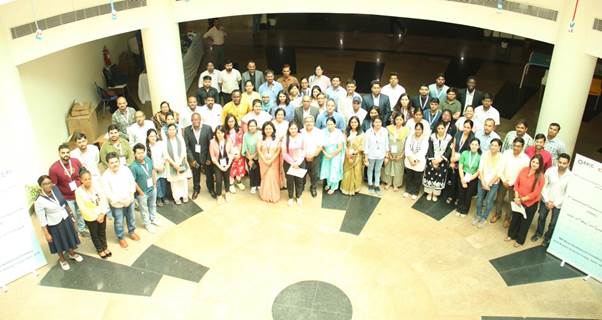DBT-iBRIC and THSTI Host 2nd Advanced Course in Vaccinology (TiVaC)
The Institute of Biotechnology Research and Innovation Council (iBRIC, an organization of the Department of Biotechnology, Government of India)—Translational Health Science and Technology Institute (THSTI)—has organized the 2nd THSTI Advanced Course in Vaccinology (TiVaC) along with the Coalition for Epidemic Preparedness Innovations (CEPI) from May 27–June 1, 2024, at the iBRIC-THSTI, Faridabad campus. The 6-day course aims to provide a comprehensive overview of the concepts and steps involved in the design, development, and commercialization of vaccines and is open to both Indian and international participants.
With the support from Coalition for Epidemic Preparedness Innovations (CEPI), 10 young researchers and professionals from Nepal, Sri Lanka, Cameroon, Ghana, Nigeria, Tanzania, Kenya, Egypt and Rwanda are attending the 2nd TIVaC. The 1st TiVaC was held in May 2023, at the iBRIC-THSTI campus.
The iBRIC-THSTI was at the center of the research and development response to combat the COVID-19 pandemic. Especially significant were the safety and efficacy studies conducted by the iBRIC-THSTI, for the vaccines under development during the pandemic, viz., Corbevax, ZyCoVD, and Covishield.
The iBRIC-THSTI has established world class infrastructure for research and has the capability and capacity to develop vaccines among other products. A Vaccine Design and Development Centre (VDDC), an ~1800 sq ft facility with state-of-the-art infrastructure, has also been established at the iBRIC-THSTI for rapid expansion of mid-level production of promising vaccine candidates.
Scientists at the iBRIC-THSTI are working on promising vaccine platforms such as the Multivalent Self-Assembled Nanocage Platform (MSN platform) and the Structure-AI-Driven Native Antigen Platform. The vaccine candidate portfolio consists of MERS spike trimers, SARS-CoV-2 spike trimers, Influenza HA trimers, Influenza NA tetramers, Nipah G tetramers, Nipah F trimers, Dengue envelope dimers, Chikungunya envelope trimers using transient expression systems in HEK293 and CHO cell lines. The development of a CHO cell line for stable production of antigens is under development.
Leveraging these capabilities, the iBRIC-THSTI is organizing the 2nd Advanced Course in Vaccinology (TIVaC). This course aims to provide a comprehensive overview of the concepts and steps involved in the design, development and commercialization of vaccines, with resource persons from Indian academia and industry.
The focus of the training would be on: basic biology and immunology of vaccine development; pre-clinical research; clinical trial design, including statistical processes; regulatory clearances and procedures; manufacturing; and quality compliance.
Training in the principles of vaccinology and immunology is a crucial aspect of appropriating global leadership in vaccine development. Keeping in view the same, the iBRIC-THSTI has opened the vaccinology course to young researchers and professionals from low- and middle-income countries (LMICs).
During the inauguration of the course, Dr. G. Karthikeyan, Executive Director of the iBRIC-THSTI, stressed the need for training in advanced fields of research and the need for training programs to enhance both institutional and national capacity in this area. He stated that “The iBRIC-THSTI would consider the possibility of setting up more short-term intense training programmes for national and international researchers.”.

